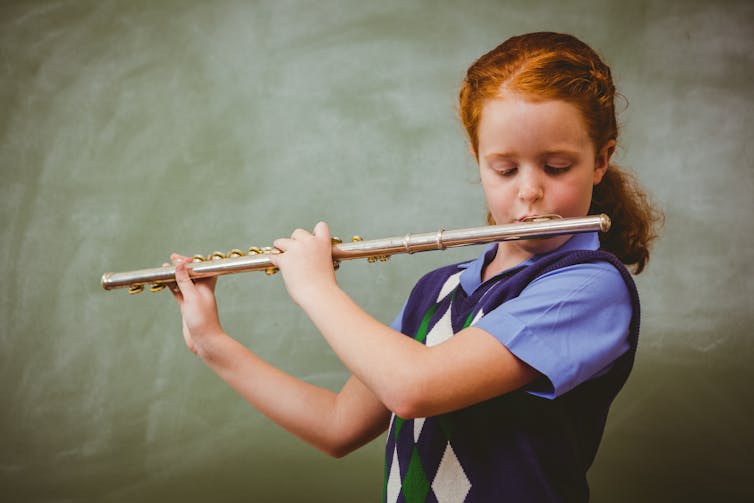Arts Education May Be Important but the Academic Benefits Are Unproven
Maths, science and literacy have been the focus of British schools for many years. These subjects are deemed to have greater currency in a competitive global economy. Competition with the international education system has also led to greater focus on these subjects in our schools.
Only should more attention exist given to the arts? In the The states, concerns are being raised about the declining accent on arts in education post-obit the No Child Left Backside Deed. In the Great britain, there accept also been calls from diverse sectors, MPs included, for greater accent on the arts in school.
The House of Lords recently argued for arts to be part of the cadre curriculum to encourage the development of inventiveness, critical thinking, motivation and self-confidence – skills necessary for innovation. Such skills are also believed to help children learn academically.
According to the Telegraph, fewer students are at present taking arts subjects because of authorities reforms and a focus on the EBacc or English Baccalaureate, which focuses on English, maths, history or geography, the sciences and a language.
A study past the Academy of Warwick warned that information technology is children from low-income families that would exist most badly affected every bit a result of this, and recommended that arts be included in the EBacc. Mike Leigh, the Oscar-award winning director, said that it was ridiculous to recall of arts every bit the preserve of the privileged, and that "art should exist a cadre subject field of all subjects, like English is, only even more so".
Many of these arguments hinge on the conventionalities that arts instruction is linked to academic attainment. Merely a systematic review carried out past myself and Dimitra Kokotsaki suggests that evidence for the academic benefits of arts education is unclear.
Looking at 199 international studies, covering pre-school through to 16-yr olds, we institute that there are equally many studies showing that arts participation in schools has no or negative bear on on bookish attainment and other not-academic outcomes as there are positive studies. Very few studies could constitute a causal effect of arts participation.
Nosotros looked at studies on a broad range of subjects, including visual arts, music, dance, theatre, hip hop, verse and creative writing.

Then what does piece of work?
Tentative evidence does suggest that both music grooming and integrating drama into the classroom may take benign effects.
Playing an instrument benefits creativity, spatial-temporal ability, IQ scores and reading and linguistic communication. Some studies also suggest that information technology can improve self-concept, self-efficacy, motivation and behaviour for secondary school children. Music pedagogy shows promise for learning outcomes and cerebral skills beyond all historic period groups.
Listening to music, nevertheless, does not seem to take a positive impact. Or at least there is no evidence to suggest that it does. Some studies showed that people who listened to classical music performed worse in memory tests than those who didn't. Results of experiments of the Mozart consequence have produced conflicting results.
At that place is likewise no evidence that engagement in visual arts, such every bit painting, drawing and sculpture, can improve academic operation. Effects on other non-arts skills such as creative thinking and self-esteem were also inconclusive.
Because of weaknesses in these studies, and the lack of replication and inconsistent findings across them, the findings must be interpreted with caution. More than robust and rigorous evaluations are needed to confirm any causal links.
Merely if improving attainment is the aim, then arts may not be the solution. Promising programmes already exist that can boost learning. Given the lack of show so far, perhaps we should remember more broadly about the purpose of arts in the context of educational policy. Can it not be just for enjoyment? Must it have a commonsensical office?
The testify we have now is just not good enough yet for the states to make conclusive statements and more robust research is conspicuously needed. Merely of course in that location is an argument for pursuing arts educational activity for its own sake – for enjoyment and appreciation.
If the arts make children happy and feel practiced about themselves, requite them a sense of achievement and aid them to capeesh dazzler, then that is justification in itself.
Source: https://theconversation.com/arts-education-may-be-important-but-the-academic-benefits-are-unproven-50496
0 Response to "Arts Education May Be Important but the Academic Benefits Are Unproven"
Postar um comentário